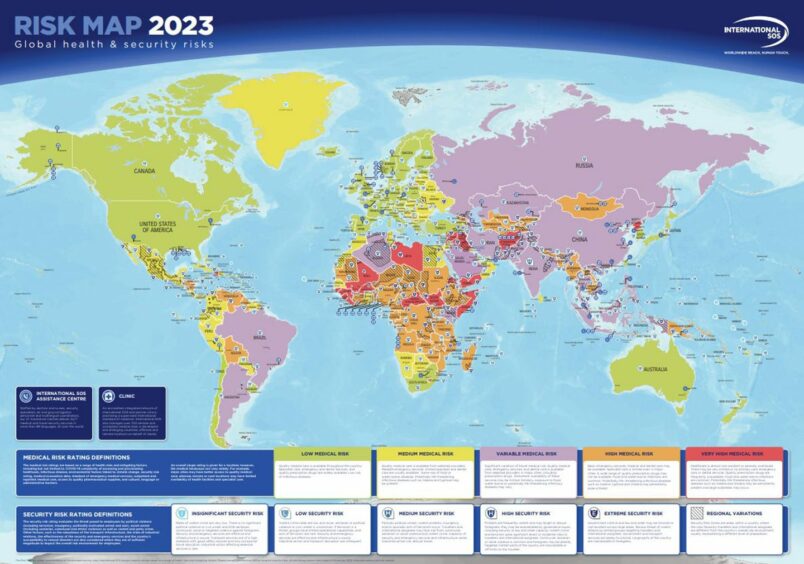
Each year, International SOS releases an interactive Risk Map, designed to help organisations and their mobile workforce better understand the risk level of each country around the world and the specific ways these risks may impact their employees.
As global risks continue to evolve around the world, using data-driven tools like the Risk Map can help organisations maintain their Duty of Care responsibilities in these often uncertain times.
This year, for the first time, the map provides a layer illustrating mental health illness globally, using external data from the Institute for Health Metrics and Evaluation, Global Burden of Disease.
It shows the estimated percentage of a location’s population suffering from mental health disorders. The data reveals the extent of the current mental health situation – current estimates show that around 14% of people (one in seven) across the world are currently experiencing one or more mental health or substance use disorder.
Dr Irene Lai, Medical Director at International SOS comments, “With travel and health risks on the rise in many regions, it is important for organisations to also focus on mitigating the ongoing impact of mental health issues.
“Although other acute medical issues which may have a significant impact regularly arise, mental health problems remain in the background and cannot be overlooked.
“Organisations must handle multiple physical and mental health issues to effectively maintain their Duty of Care responsibilities.”
One of the notable improvements in medical risk for 2023 is the Caribbean islands, largely due to the easing of COVID-related travel restrictions.
On the other hand, the medical risk for Mali has increased to ‘Very High’ as the security environment is complex. This has led a challenging humanitarian situation and is resulting in the weakening of healthcare systems against increased demand.
The Risk Map also provides a better understanding of the wider security situation in countries which mobile workers may be travelling through or working in – which, in turn, helps inform organisations to enable them to create tailored solutions to mitigate the specific risks that their workforce may encounter.
The major security crisis from the past year has undoubtedly been the conflict in Ukraine. This has been reflected in the security focused map.
Sally Llewellyn, Security Director at International SOS comments, “The security crisis in Ukraine has clearly been significant, impacting both the country and bordering regions in a number of ways.
“At International SOS, we have worked with a variety of organisations through this challenging period, often directly supporting them with all their security, health, and travel needs.
“For instance, we have organised evacuations for large multinationals, helping some of their workforce leave Ukraine where necessary.
“We also support organisations who have remained in Ukraine, providing on-the-ground assistance and timely information on the risks which may impact them.
“This is particularly important for NGOs, for the media, and for professional services companies, where many Ukrainian employees now want to return home to visit loved ones.”
Despite the wide-reaching impact of the Ukraine conflict and the rise in social unrest associated with cost of living increases, the underlying security risk environment across Europe has not changed.
Outside of Ukraine the most notable risk rating increases have been in the Sahel where extreme security risk zones have expanded due to the rising risk of militancy – a trend also notable in Mozambique and other parts of Africa.
Whilst in Colombia, a rise in criminality resulting in part from the socio-economic impacts of the COVID-19 pandemic has led to an increase in high-risk zones.
Employees are more attuned to risks, and many are now more anxious about travel than pre-pandemic.
Organisations must account for risk rating changes and trends in their planning. Managers should ensure employees have access to reliable information about the risks they may face, support with effective mitigation measures, and provide clear communication plans for employees before and during higher risk travel.
If you are interested in finding out more about the solutions offered by International SOS and how we can support your workforce, please contact Nicola Yates – nicola.yates@internationalsos.com – or visit my.internationalsos.com/ukhealth.
